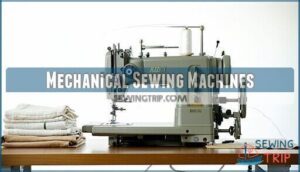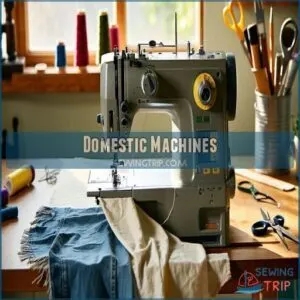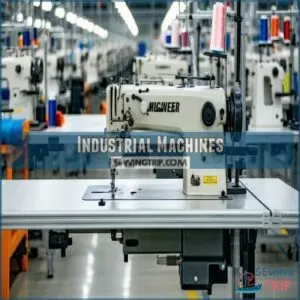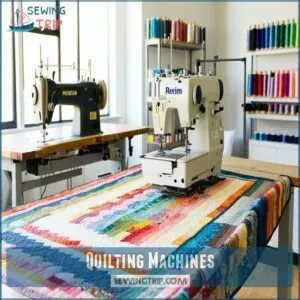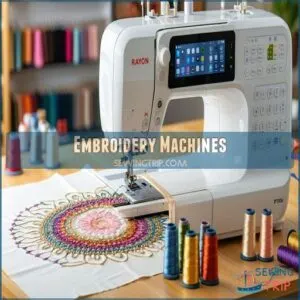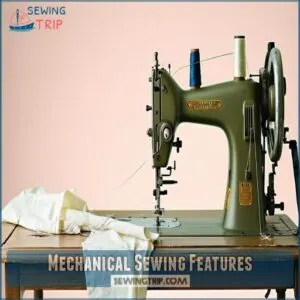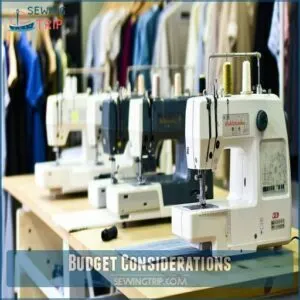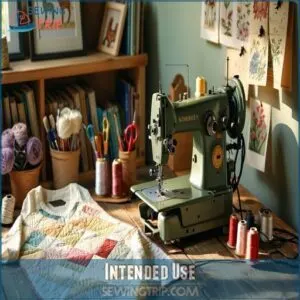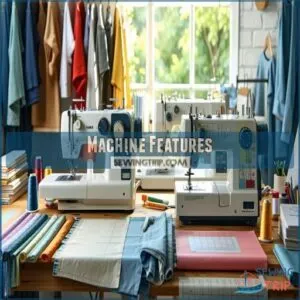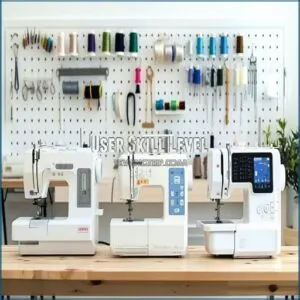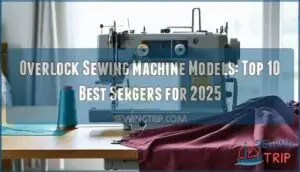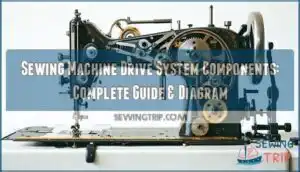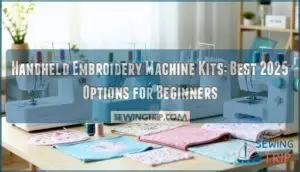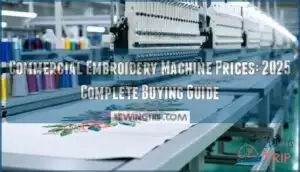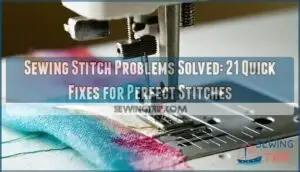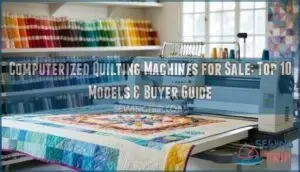This site is supported by our readers. We may earn a commission, at no cost to you, if you purchase through links.
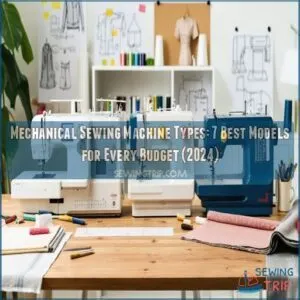 You’ll find four main mechanical sewing machine types to suit your crafting needs.
You’ll find four main mechanical sewing machine types to suit your crafting needs.
Domestic machines handle everyday projects with basic stitch options and user-friendly controls – think of them as your reliable kitchen mixer.
Industrial machines pack more punch for heavy-duty work, while quilting machines sport wider throats for wrestling those bulky projects.
For the artistic souls, embroidery machines offer decorative possibilities.
Each type comes with distinct features like automatic buttonholers and adjustable presser feet, making them perfect companions for specific tasks.
Budget-friendly options start at $50, while premium models deliver professional-grade performance and durability for serious sewists.
Table Of Contents
Key Takeaways
- You’ll find mechanical sewing machines ideal for basic projects, offering manual controls for stitch settings and reliable performance at an affordable price.
- They typically feature essential tools like adjustable presser feet, simple stitch options (10-30 built-in stitches), and time-saving enhancements like automatic buttonholers and needle threaders.
- Mechanical machines are low-maintenance and durable, making them perfect for beginners or casual sewists who value cost efficiency and simplicity over advanced features.
- While they handle everyday fabrics well, they’re less suited for complex patterns, heavy-duty materials, or decorative stitching compared to specialized or computerized machines.
Mechanical Sewing Machines
You’ll find mechanical sewing machines are perfect for basic projects, with simple dials and buttons that give you complete control over your stitching settings.
While they offer fewer stitch options than computerized models, you’ll appreciate their affordable price point and reliable performance for everyday sewing tasks.
Basic Operation
A mechanical sewing machine‘s thread tension and stitch length controls are like a car’s gears – they need your hands-on attention.
You’ll manage your sewing speed through the foot pedal while keeping an eye on bobbins management.
Unlike computerized models, mechanical sewing machines put you in the driver’s seat, requiring manual adjustments for each stitch but giving you complete control over your project with complete control.
Limited Stitches
While mechanical sewing machines excel at basic operations, you’ll find they come with a more modest stitch variety.
Most basic sewing machines offer between 10-30 built-in stitches, covering your essential straight stitch, zigzag, and lockstitch patterns.
Don’t let this limit your creativity though – these mechanical stitch options handle most everyday sewing tasks perfectly well, from simple repairs to basic garment construction.
Affordable Price
Beyond basic stitch options, mechanical sewing machines won’t break your bank. You’ll find budget options starting around $100-$200, perfect for beginners or occasional sewists.
Cost savings come from their simpler design – fewer electronics mean fewer repair headaches. Basic sewing machines like Singer and Brother offer solid discount deals, often bundled with essential accessories.
For a reliable mechanical sewing machine, you’re getting serious value. However, for those seeking advanced features like precision sewing, computerized models provide enhanced stitching capabilities and improved efficiency.
Sewing Machine Types
You’ll find four main types of sewing machines to match your creative needs: domestic machines for everyday projects, industrial models for heavy-duty work, quilting machines for larger pieces, and embroidery machines for decorative stitching.
Whether you’re fixing a torn seam or starting your own clothing line, understanding these different types will help you pick the perfect machine for your sewing adventures.
Domestic Machines
Domestic sewing machines are your go-to tools for home sewing projects.
These machines are built to handle fabric choices from light cottons to medium-weight denims.
You’ll find features like automated needle threaders and adjustable stitch lengths perfect for everyday tasks.
For domestic sewing machines, they’re not just user-friendly – with proper machine maintenance and quality thread types, they’ll tackle most of your sewing notions needs right at home.
Industrial Machines
Three key factors set industrial sewing machines apart from their domestic counterparts: durability, speed, and precision. Built for mass production, these heavy-duty workhorses handle demanding factory equipment needs with ease.
Industrial Sewing Machines are typically used in large-scale manufacturing environments to maximize efficiency and productivity.
- Lockstitch machines power through thick materials at 1,000+ stitches per minute
- Built-in storage keeps manufacturing tools within arm’s reach
- Industrial-grade motors run continuously without breaking a sweat
- Specialized feet tackle heavy-duty sewing tasks like a pro
- Robust feeding systems guide multiple fabric layers smoothly
Quilting Machines
Unlike industrial powerhouses, quilting sewing machines provide a gentler touch for your textile artistry.
While mechanical sewing machines handle basic tasks, quilting machines excel at managing multiple fabric layers with precision.
Understanding quilting basics is essential for selecting the right machine for your needs.
Here’s a handy comparison of features:
| Feature | Basic Model | Premium Model |
|---|---|---|
| Free Motion | Limited | Full Range |
| Thread Choices | Standard Only | Multiple Options |
| Fabric Selection | Light to Medium | All Types |
These specialized machines come with larger throat spaces, stronger motors, and adjustable presser feet for your creative quilting projects.
Embroidery Machines
Embroidery sewing machines transform ordinary fabric into personalized masterpieces.
With computerized controls and specialized embroidery software, you’ll create intricate stitch patterns and custom designs.
These machines handle various thread types, from metallic to rayon, and come with built-in embroidery patterns.
Fabric selection is essential – you’ll need the right stabilizer and hoop size for your projects.
Modern embroidery machines even let you import designs via USB.
Mechanical Sewing Features
You’ll find mechanical sewing machines equipped with essential features like automatic buttonholers and needle threaders that make your sewing projects easier to complete.
These time-tested machines also come with adjustable presser feet and simple power controls that’ll help you master basic stitching techniques without getting overwhelmed by complicated settings.
Automatic Buttonholer
The automatic buttonholer on mechanical sewing machines takes the headache out of creating perfect buttonholes every time. You’ll find this feature invaluable for:
- Adjusting buttonhole settings with simple dial controls
- Maintaining consistent stitch quality across different fabric types
- Setting your preferred sewing speed for precise results
- Achieving balanced thread tension automatically
- Creating professional-looking buttonholes without manual measuring
The use of computerized sewing machines can greatly enhance the efficiency and precision of automatic buttonhole sewing.
This time-saving feature transforms tricky buttonhole projects into quick, foolproof tasks that even beginners can master.
Needle Threader
After mastering buttonholes, you’ll love your mechanical sewing machine’s needle threader.
This clever sewing machine part saves your eyes and patience by guiding thread right through the needle’s eye.
Whether you’ve got an automatic needle threader or semiautomatic version, proper thread management is key.
Keep your needle threader clean during machine upkeep to maintain smooth thread tension and prevent frustrating snags.
Presser Feet
Presser feet, those handy sewing aids that guide your fabric, come in various types for your mechanical sewing machine.
You’ll need these essential accessories to tackle different projects with confidence:
- All-purpose foot for straight stitching and basic seams
- Zipper foot for installing zippers and piping
- Buttonhole foot for perfect buttonholes
- Walking foot for quilting and thick fabrics
- Blind hem foot for invisible hems
Power Switch
Located strategically on mechanical sewing machines, the power switch isn’t just a simple on/off button—it’s your gateway to safe sewing.
You’ll find it’s integrated with essential power controls and electrical systems for smooth machine startup. Modern switches include safety features and energy efficiency options, giving you complete control over your sewing experience.
| Switch Type | Safety Features | Energy Rating |
|---|---|---|
| Basic Toggle | Auto-Off Timer | Standard |
| Push Button | Child Lock | Enhanced |
| Rotary Dial | Surge Protection | Premium |
| Touch Sensor | Overload Guard | Advanced |
| Smart Switch | Remote Control | Ultra-Efficient |
7 Best Mechanical Sewing Machines
You’ll find the perfect mechanical sewing machine for your needs in our carefully tested selection of seven reliable models that won’t break your budget.
From basic starter machines to heavy-duty workhorses, we’ve spent countless hours testing these machines to help you make the right choice for your sewing projects.
1. Singer Easy Sewing Machine Starter
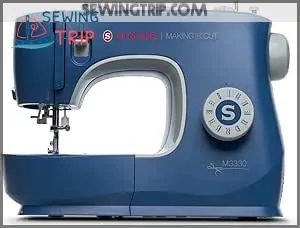
Looking for a reliable starter machine? The SINGER M3330 Making the Cut edition packs impressive features for beginners.
You’ll find 97 stitch applications suitable for everything from sheer fabrics to denim, backed by a sturdy full metal frame that’ll last for years.
The built-in LED lighting system guarantees you’ll see every detail clearly, while the automatic needle threader saves you from squinting.
With a generous 5.7" sewing space and included accessories like specialized feet and bobbins, you’re ready to tackle any project straight out of the box.
Best For: Beginners and intermediate sewists looking for a feature-rich machine that can handle various projects while remaining user-friendly.
- Versatile 97-stitch selection allows you to tackle everything from basic repairs to decorative projects without limitations
- Full metal frame construction ensures long-term durability and stable sewing on different fabric types
- Comprehensive accessory package includes essential feet and tools so you can start sewing right away
- Limited workspace depth might make quilting and larger projects more challenging
- Single-step buttonhole feature, while convenient, offers only one style option
- LED light system, though bright, cannot be replaced if it fails since it’s built into the machine
2. Portable sewing machine for crafts
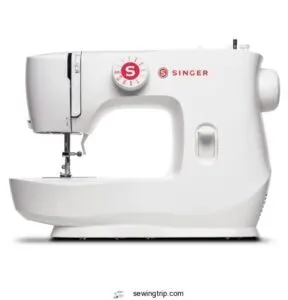
The SINGER MX60 consistently proves itself as a standout portable sewing machine for crafting enthusiasts.
At just 10 pounds with compact dimensions of 7 x 13 x 11.5 inches, you’ll easily find space for it in any craft corner.
You’ll appreciate its 57 stitch applications and 6 built-in stitches, perfect for tackling various projects from quick repairs to creative endeavors.
While it doesn’t include a carrying case, its metal frame guarantees stability without compromising portability.
The front-loading bobbin system and straightforward stitch selection dial make it particularly beginner-friendly.
Best For: Beginners and casual crafters seeking a lightweight, portable sewing machine for basic projects and creative endeavors.
- Lightweight and compact design makes it perfect for small spaces and easy to store between craft sessions
- User-friendly interface with simple controls and preset stitches makes it approachable for newcomers to sewing
- Durable metal frame construction provides stability while sewing, despite its portable size
- No carrying case included, which limits true portability and protection during transport
- Front-loading bobbin system can be trickier to use than modern drop-in designs
- Some users report issues with machine locking up during smaller stitches, which could limit detailed craft work
3. Janome heavy duty sewing machine
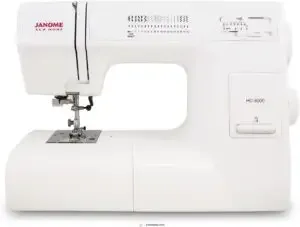
Three standout features make the Janome HD3000 a powerhouse in heavy-duty sewing.
You’ll love its solid aluminum construction, which handles everything from delicate silks to thick denim without breaking a sweat. The jam-proof bobbin system and 7-piece feed dog guarantee smooth, precise stitching every time.
With 18 built-in stitches and an automatic one-step buttonhole, you’re equipped for any project. While it’s a bit pricier than basic models, sewists rave about its whisper-quiet operation and minimal maintenance needs.
It’s like having a reliable workshop partner that never calls in sick.
Best For: Serious sewists and professionals who need a reliable, heavy-duty machine for tackling thick fabrics and demanding projects like upholstery, denim, or theatrical costumes.
- Built like a tank with solid aluminum construction and whisper-quiet operation that can handle hours of continuous use
- Versatile 18-stitch selection with jam-proof bobbin system makes it ideal for both everyday sewing and specialized projects
- Exceptional fabric control thanks to the 7-piece feed dog system and adjustable presser foot pressure
- Higher price point may be difficult to justify for casual or beginning sewists
- Buttonhole feature has a learning curve and can be tricky to master at first
- Limited stitch options compared to computerized machines in the same price range
4. Brother GX37 Sewing Machine Model
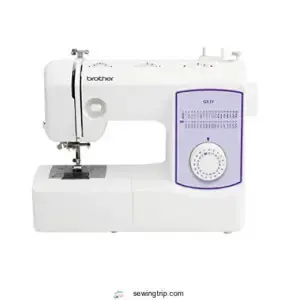
Looking for a versatile mechanical sewing machine that won’t break the bank? The Brother GX37 stands out with its 37 built-in stitches and auto-size buttonhole feature.
You’ll appreciate the jam-resistant drop-in bobbin and automatic needle threader, making setup a breeze. It comes equipped with six different sewing feet and extensive accessories, perfect for both beginners and seasoned sewists.
Whether you’re hemming pants or tackling quilting projects, this US-voltage model delivers consistent results. Plus, you’ll get free technical support for life, ensuring you’re never stuck on a project.
Best For: Beginner to intermediate sewists looking for a reliable, feature-rich mechanical sewing machine for everyday projects and basic quilting.
- Easy setup with automatic needle threading and jam-resistant drop-in bobbin system makes getting started hassle-free
- Comprehensive accessory package includes 6 different feet and essential tools for various sewing tasks
- Free lifetime technical support provides peace of mind for troubleshooting and maintenance
- Limited to 120V US power systems, restricting international use and travel
- 37 built-in stitches may not be enough for advanced decorative work
- Mechanical dial controls require manual adjustment compared to computerized models
5. Singer Beginner Sewing Machine Kit
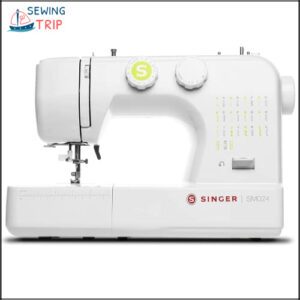 View On Amazon
View On Amazon
With reliability at its core, the SINGER SM024 sewing machine delivers 24 versatile stitch options perfect for beginners.
You’ll appreciate the fast threading system and smooth 4-step buttonhole feature that make basic repairs a breeze.
The durable all-metal frame keeps your workspace steady at any speed, while brilliant LED lighting illuminates your projects.
The kit comes loaded with essentials – multiple presser feet, bobbins, and needles. Though some users find the threader tricky, the detailed manual helps you master this budget-friendly powerhouse quickly.
Best For: Beginner sewers and hobbyists looking for an affordable, easy-to-use sewing machine with reliable features for light projects.
- 24 stitch options and a user-friendly 4-step buttonhole feature simplify projects.
- Durable all-metal frame ensures stability during use.
- Includes essential accessories and LED lighting for improved visibility.
- Threader feature can be unreliable for some users.
- Occasional issues with tension adjustments may require extra troubleshooting.
- Not suitable for heavy-duty sewing or thicker fabrics.
6. Mechanical Sewing Machine for Beginners
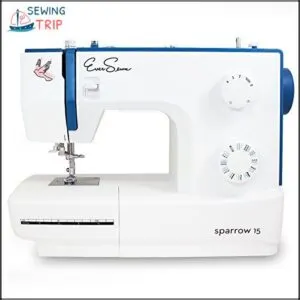
The EverSewn Sparrow 15 is a no-nonsense option for beginners who want simplicity without sacrificing quality.
With 32 built-in stitches, including quilting and decorative options, it offers plenty of room to grow.
Its automatic needle threader and side thread cutter make setup a breeze, while the 750 stitches per minute speed keeps projects moving.
Lightweight yet sturdy with a heavy-duty metal frame, it’s ideal for kids, hobbyists, or as a travel machine.
Affordable and user-friendly, this machine gets the basics right.
Best For: Beginners, kids, and hobbyists looking for an affordable, simple, and portable sewing machine.
- 32 built-in stitches offer versatility for various projects.
- Lightweight and portable with a heavy-duty metal frame for durability.
- Easy-to-use features like an automatic needle threader and side thread cutter.
- Limited stitch width and length might not suit advanced projects.
- Some users report noise and stitch quality issues.
- Customer service and warranty claims can be problematic.
7. Brother Heavy Duty Sewing Machine
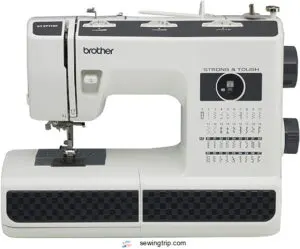
Looking for a tough sewing companion? The Brother Heavy Duty Sewing Machine balances strength and convenience.
It handles thick fabrics like denim and even six vinyl layers. Equipped with 37 built-in stitches, an automatic needle threader, and a jam-resistant drop-in bobbin, it’s sturdy and dependable when you need it.
A free arm makes sewing cuffs and sleeves simple, while six included feet expand its versatility. Its quiet operation is a bonus, though avoid cheap thread—it’s picky!
The Brother heavy duty sewing machine is perfect for heavy-duty projects without fuss.
Best For: Sewers who tackle heavy-duty fabrics and projects but also appreciate user-friendly features.
- Powers through thick fabrics like denim and vinyl with ease.
- Convenient features like automatic needle threading and a jam-resistant bobbin.
- Versatile with 37 stitch options, a free arm, and included sewing feet.
- Can be finicky with cheap thread.
- Some users report a burning plastic smell from the pedal.
- Not suitable for nylon material.
Selecting Mechanical Machines
Choosing the right mechanical sewing machine means balancing budget, features, and your sewing needs to get the best fit.
With so many options, it’s all about ensuring the machine matches your projects and skill level without overcomplicating things.
Budget Considerations
Balancing sewing machine prices with performance is key for budget-conscious buyers.
Entry-level mechanical sewing machines, typically $50–$200, suit basic needs, while mid-range models ($200–$500) offer better features without breaking the bank.
To maximize long-term costs, assess value by prioritizing essential features over fancy extras.
An affordability analysis guarantees you get a dependable sewing machine for budget-friendly success.
Intended Use
Think about what you’ll sew most often. For home sewing projects like clothing repairs, beginner projects, or simple crafting, domestic sewing machines are perfect.
Need heavy-duty sewing or quilting? Go for industrial or specialized models.
Mechanical sewing machines shine for basic alterations and straightforward tasks, making them ideal for hobbyists craving control without the complexity of computerized features.
Machine Features
Understanding mechanical machine features is important for making an informed decision.
Look for stitch regulation, adjustable tension, and reliable bobbin mechanisms to simplify your projects. Feed dog control is a must for smooth fabric movement.
Varied stitch types and buttonhole styles open up creative possibilities. Practical sewing machine features like easy-to-use controls and manual adjustments make these machines perfect for versatile, everyday tasks.
User Skill Level
Your skill level matters when choosing mechanical sewing machines. Beginners can explore basic models like a manual sewing machine or beginner sewing machines with preset stitches.
Intermediate users need machines for layered fabrics and more functions. Advanced and professional applications demand precision for expert techniques.
A hand-operated sewing machine suits casual users; pros, however, prefer robust models for detailed projects. When selecting a machine, considering the best sewing machines for specific needs can help users make an informed decision.
Frequently Asked Questions (FAQs)
What are the different types of sewing machines?
Sewing machines come in mechanical, computerized, quilting, and embroidery types for home use.
You’ll also find industrial options like heavy-duty, chain stitch, and sergers designed for professional production and specialized tasks.
What is a mechanical sewing machine?
A basic machine that uses manual dials and buttons to control your stitching.
You’ll find it’s straightforward to operate, with simple mechanical parts that handle everyday sewing tasks without fancy electronic features.
How do you classify a sewing machine?
Look at the machine’s operation method (manual, electronic, or computerized), its intended use (domestic or industrial), and specific functions (basic stitching, quilting, or embroidery) to properly classify your equipment.
Are mechanical sewing machines a good choice?
You’ll find mechanical sewing machines perfect if you’re starting out or need reliability. They’re budget-friendly, easy to maintain, and handle basic projects well. Don’t expect fancy features, but they’re workhorses.
What are the different types of embroidery sewing machines?
There are three main types: basic single-needle machines for simple patterns, multi-needle machines for commercial work, and specialty machines with advanced features like automatic thread cutting and built-in design libraries.
What is a manual sewing machine?
Purposefully pedaling produces perfect patterns with a manual sewing machine.
It’s powered by your foot movements on a treadle or hand-spinning wheel, giving you complete control over stitch speed and tension without electricity.
How often should mechanical sewing machines be serviced?
You’ll want to service your sewing machine every 12 months or after 100 hours of use, whichever comes first. Regular maintenance keeps your machine running smoothly and prevents costly repairs.
Can mechanical sewing machines handle leather materials?
Imagine driving a compact car on rocky terrain—it’s possible, but not ideal.
Mechanical sewing machines can handle leather, but only lightweight types.
Use a leather needle, adjust tension, and sew slowly for best results.
What oil type works best for mechanical machines?
Use clear, non-detergent sewing machine oil to keep everything running smoothly.
Avoid household oils—they gunk things up faster than you’d think.
A few drops go a long way, so don’t overdo it!
How long do mechanical sewing machine needles last?
Needles don’t last forever—they’re like the tires on a well-traveled car.
Replace yours after 8-10 hours of sewing or when it feels dull, skips stitches, or starts snagging fabric.
It’s maintenance 101!
Conclusion
Think of choosing the perfect mechanical sewing machine type as finding a reliable partner for your crafting journey.
Whether you’re tackling quick fixes, conquering quilting projects, or diving into embroidery, there’s a machine to fit your style and budget.
Focus on features like adjustable presser feet and automatic buttonholers to match your needs, with options from beginner models to heavy-duty workhorses, you’ll find a dependable machine ready to transform your ideas into beautifully sewn creations.
- https://www.sailrite.com/Sailrite-Ultrafeed-LS-1-BASIC-Walking-Foot-Sewing-Machine?gclid=CjwKCAjw9-KTBhBcEiwAr19ig89Va91RdCIm_4JuYcIbRc1xJuxjFcXXUOKvIFI78XNyFAbiC0OWABoCvWgQAvD_BwE
- https://thecraftyneedle.com/sewing/guides/types/
- https://sewinginsight.com/best/best-mechanical-sewing-machines/
- https://sewingpoint.com/the-ultimate-guide-to-mechanical-sewing-machines/
- https://sewguide.com/types-of-sewing-machines/

